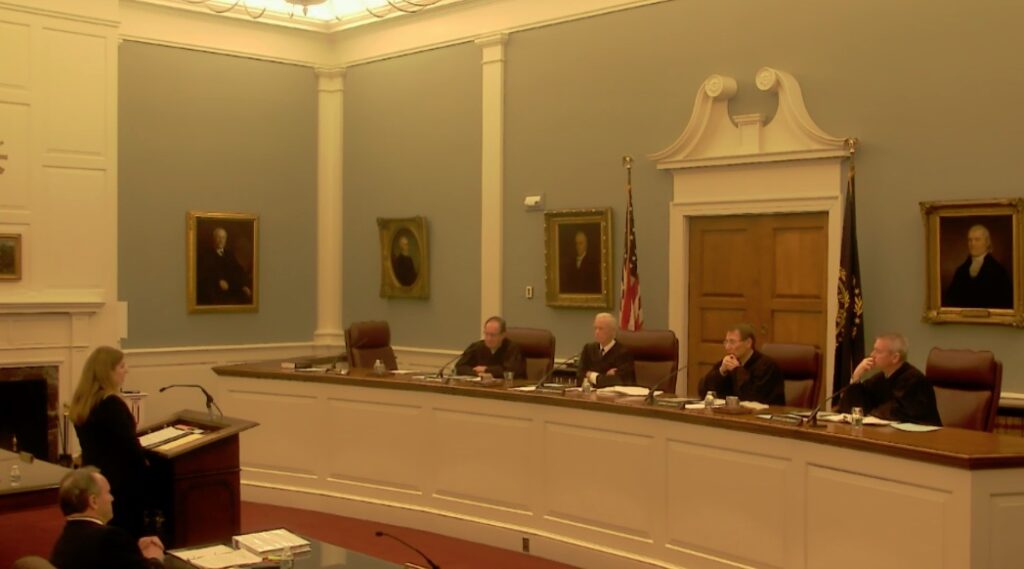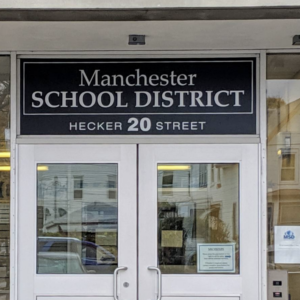Call it the “Don’t Let the Door Hit You” Defense.
During oral arguments in a lawsuit over its policy of keeping parents in the dark about their children’s behavior, the Manchester School District’s attorney told the state Supreme Court that parents shouldn’t be able to challenge the district’s policy. Instead, they should pull their kids out of public school and go somewhere else.
“If the parents want to make a different choice, they can homeschool, or they can send their child to a private school; those are options available to them,” said attorney Meghan Glynn.
The district is being sued over its policy of keeping students’ behavior related to sex and gender secret from their parents.
Richard Lehmann, the attorney for the Manchester mother going by Jane Doe, who filed the lawsuit, said parents have the right to know if their children are being socially transitioned in schools with the aid of school staff.

Manchester School District lawyer Meghan Glynn told Supreme Court justices that parents who don’t like the district’s policies can send their kids to private school.
“The real issue is not a school reporting on what a student is doing in school, but for the school to report what the school itself is doing in school,” Lehmann said.
Lehmann rejected the argument that Doe’s lawsuit was an attempt to force the district to out LGBT students to their parents. He argued that it is about a government entity usurping parental powers and making decisions in place of a parent.
“This is the government substituting its own judgment over a parent’s judgment when it comes to gender identity,” Lehmann said.
Jane Doe stated in her original complaint that she found out in the fall of 2021 that her child was using a different pronoun and gender identity at school. The school’s name was withheld in court documents to protect the child’s identity.
The mother spoke with school staff, including the student’s guidance counselor. According to the lawsuit, the mother made it clear she wanted her child to be called by the name and pronouns the child had at birth while in school.
Even though the staff she spoke to initially agreed, the mother received an email from the school principal stating that the mother’s instructions were being overridden due to the district’s policy. According to the lawsuit, the principal stated that the district’s policy requires school staff to keep such matters secret from parents if the child so chooses. Even if staffers agree to use the child’s true gender identity when speaking with the mother, they would be obligated to not tell the mother if the child wished to be identified as something else.
The policy states teachers and staff are not to tell anyone about a child’s gender identity without the express consent of the child. School employees are also directed to use the child’s biological pronouns and given name when talking about the child to people who do not know about the nonconforming gender identity.
Last September, Hillsborough Superior Court Judge Amy Messer ruled in favor of the school district, declaring parents ultimately do not have the right to direct how their children are to be educated in public schools.
“(T)he right to make decisions about the care, custody, and control of one’s child is not absolute,” Messer wrote.
Because Justice Anna Barbara Hantz Marconi has recused herself from the case without giving a reason, the court may issue a 2-2 tie decision. If they do, Messer’s original ruling will stand.
On Friday, Glynn maintained the Manchester school staff, and officials did not lie to Doe about her child’s gender identity. They simply followed policy.
“If the issue, in this case, is truly that the district has a constitutional duty to report what the school is doing, the school has met that burden,” Glynn said.
Glynn said that parents have the right to have their voice heard when the district crafts policies, and they have the right to vote out school board representatives who pursue policies they do not support. A comment from Justice James Bassett seemingly rebuked this line of reasoning.
“Constitutional rights are not up for a vote,” Bassett said.
In fact, parents’ rights are coming up for a vote in the New Hampshire House. Last week, the House Education Committee cast a 10-10 party-line vote on SB272, the Parents Bill of Rights. The full Hous is expected to vote on the legislation, which is supported by Gov. Chris Sununu, later this month.
Glynn cautioned the justices that if they decide in favor of Doe and parents’ rights in this case, more lawsuits will likely come.
“The next case up is going to be the case of a student,” she said.




